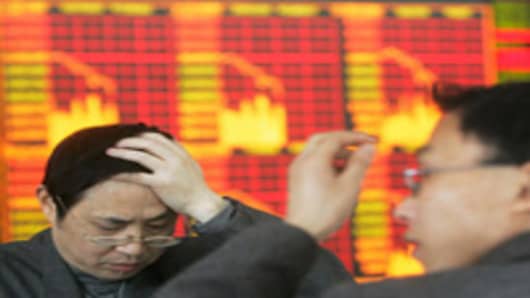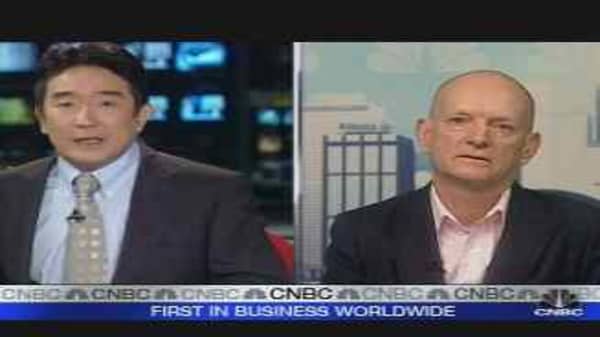The emergency measures taken by the U.S. Federal Reserve to stem a fast-spreading global financial crisis didn't do much to prevent a sell-off in Asia. Markets took a beating, sinking to their lowest levels since August 2007 on intensified concerns that there could be more victims of the global credit crisis.
Asian investors were served a double whammy just before markets opened. First, JPMorgan Chase announced it would buy ailing investment bank Bear Stearns for $2 a share. This values the U.S. investment bank at the center of the credit crisis at about $236 million.
Right on the heels of this news, the Fed cut the discount rate to 3.25 percent and set up a new program to provide cash to a wider range of big financial firms previously unable to borrow directly from the central bank. The rate cut was in concert with a decision to approve special financing to facilitate JPMorgan's purchase of Bear Stearns. The Fed agreed to fund up to $30 billion of Bears' less liquid assets.
"This is an investor's worst fear realized -- a major surprise just ahead of official reporting and a serious failure in the financial sector ... investors are now looking at what are the ravages of a bear market. New fund flows to the region (Asia) are rather limited and we're starting to see pullback from investors overseas through redemptions", Mark Konyn, CEO of RCM Asia Pacific told CNBC's Cashflow.
The turmoil looks set to hit the U.S. when markets there open later in the session. Stock futures dropped in Asian trade, pointing to a sharply lower Wall Street open, as global investors wonder if other financial institutions might need rescuing. S&P 500 futures were down 30 points, while Dow Jones Industrial Average futures shed more than 200 points.
David Roche, global strategist at Independent Strategy Limited, told CNBC's Asia Squawk Box, "the problem in the U.S. at the moment is they're in a form of denial in which the Fed is both printing money, injecting liquidity and saving banks. The general impact is not to re-establish credibility and confidence, but to actually detract from it and to prevent the cleansing of balance sheets that should be taking place."
But other analysts were impressed with the Fed's actions.
"I am quite impressed by the way the Fed has handled the panic. This is clearly a solvency crisis. Banks need to be recapitalized. The Fed has been able to find the capital needed to recapitalize those banks from private sector sources, sovereign wealth funds and healthy U.S. banks. It has maintained market functionality through liquidity injections through targeted measures," Dominique Dwor-Frecaut, macro strategist at ABN Amro said.
Paul Markowski of Global Strategies Analysis Group added that "what the Fed did this weekend, beginning on Friday, was to tell everyone that they are there. They are the lender of last resort and they will (do what's) necessary to provide the liquidity for the markets."
But Roche disagreed. "If you look at what's happening to Bear Stearns, this is policy that's being made on the hoof. A week ago, it was fine, they said it was fine. BSC shares were worth $30 at the Friday's close. Today they're worth $2. Now it's a takeover through a commercial bank. Is that policy? No, that is actually a disorderly series of reactions to events which should actually have been dealt with before hand," Roche argues.
And markets in Asia seemed to agree. The news spooked investors, who went on a selling spree. Markets plummeted -- Japan's Nikkei 225 Average sank as much as 4 percent while Hong Kong's Hang Seng Index was down over 1,000 points at one stage, shedding as much as 5 percent.
Asian stocks are suffering from a painful 2008 as subprime and credit-related writedowns in the global financial sector are happening at a time when analysts fear the U.S. economy is in or about to enter a recession.
The twin effects are having a knock-on effect from Bangkok to Tokyo. Local currencies are strengthening in line with the slumping dollar, denting the growth outlook for the export-dependent region by hitting returns from overseas and making goods less competitive.
The U.S. dollar sank to a record low against the euro , and fell below 97 yen , a level not seen since 1995. Spot gold set a new life record -- $1,030 an ounce. Oil jumped to a fresh peak, with crude for April delivery up at 88 cents at $111.09 a barrel.
Surging food and energy prices are hitting the pocketbooks of Asian consumers, leaving central banks in a bind as they must deal with slowing economic growth but rising inflation.
The uncertainty has caused futures on the federal funds rate to soar, with the March futures contract showing a roughly 25 percent chance of 125 basis points of cuts at the Fed's policy meeting on Tuesday.




